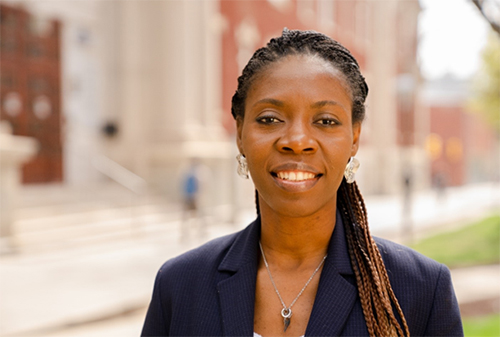
Opeyemi Babajide, PhD, is a postdoctoral research fellow in Drexel's Urban Health Collaborative department. Originally from Nigeria, Dr. Babajide received her PhD in biostatistics, focusing on medical demography.
Currently, Dr. Babajide engages in a dual approach to her work. Globally, she focuses on understanding and addressing complexities in non-healthcare systems in African cities for sustainable urban health improvements. Locally, she strives to study and improve maternal health outcomes among Black immigrant women, particularly within the African immigrant community in Philadelphia. Her commitment is evident through co-leading the Black Immigrant Health Working Group, showcasing a dedication to community-driven research.
Learn more about Dr. Babajide's inspirations, current research, vision and wellness tips here:
What inspired you to choose your current path as a postdoc?
During my PhD, I worked on some research fellowships that exposed me to urban health; general population health within the urban environment. So, when I saw this current position advertisement, I felt it was a much-needed opportunity to continue my research, as I had just published four papers in the Journal of Urban Health. It seemed right as an emerging voice in the field. Also, the Urban Health Collaborative at Dornsife School of Public Health is one of the most renowned, if not the best, centers on Urban Health, globally. Nothing beats being trained in the best practices of one's field.
What observation is your research based on? What started this research?
My research is grounded in the observation of disparities in maternal health outcomes among Black immigrant women in the growing African immigrant population in the US, particularly in Philadelphia. The need to address these disparities and foster better health outcomes within this community ignited my research interest and led to the inception of this study.
How do you see your research being used in the next 5 years? 20 years?
In the next five years, I envision my research contributing to targeted interventions and policy recommendations aimed at improving maternal health outcomes among Black immigrant women in Philadelphia. This could involve developing and implementing community-based programs and initiatives focused on addressing the specific healthcare needs of this population. Looking ahead 20 years, I anticipate that the findings and insights gained from this research could significantly influence broader healthcare strategies not only in Philadelphia but also in other cities with growing African immigrant communities. By then, I hope these insights will have played a role in shaping more inclusive and culturally competent healthcare systems, leading to better maternal health outcomes for Black immigrant women across the United States. Additionally, the long-term impact might involve systemic changes, policy shifts, and increased community engagement, creating a more equitable healthcare landscape for marginalized populations.
Do you have any wellness/resilience tips?
Stop. Move away from the challenging situation. Regroup. Try again! When I am on the Stop and Move stage, I watch Hallmark movies, something predictable and happy!